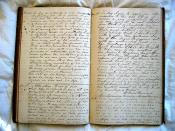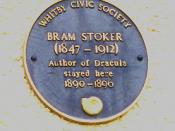How the use of the diary form narrative is beneficial to the novel Dracula.
Bram Stoker, being the creative and intellectual writer himself, wrote the novel
Dracula in the diary form of narrative. This was a good choice of how to write the novel
since it was very beneficial to the plot of Dracula. Examples of how the diary form is
beneficial to Dracula is seen in his writing and book.
One of the greatest benefits of the diary narrative is that the reader is allowed
see, and feel the emotional hearts and souls of the emotional characters. This is great
because when a character is not feeling too great and is trying hide something, the reader
knows this, and therefore the reader knows everything that is happening; nothing is being
hidden from the reader. An example of this happening is when Mina is at the insane asylum
and is worried sick about something happening to Jonathan Harker. Mina hides all that she
feels when Jonathan Harker is near her. All that Mina is feeling is written by herself, and
what, how she is feeling is ready for a reader to examine because they are able to see her
diary. If Mina's diary was not open to the reader, or if Someone was telling of what he or
she saw, the observation could be false and the reader would lose valuable information that
would be valuable to the whole plot of the book.
Some things that can be noticed about the diary form is that different views of the
same thing can be expressed by many different people; all in first person view. Then, along
with that, there are extensive and very detailed descriptions about a thing, or person that
is being described. In the novel, this is...


